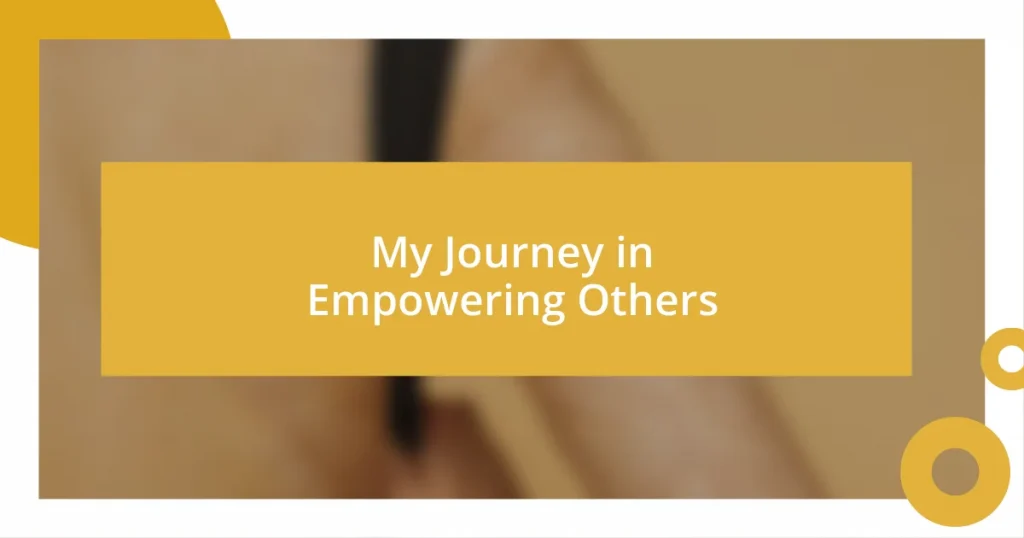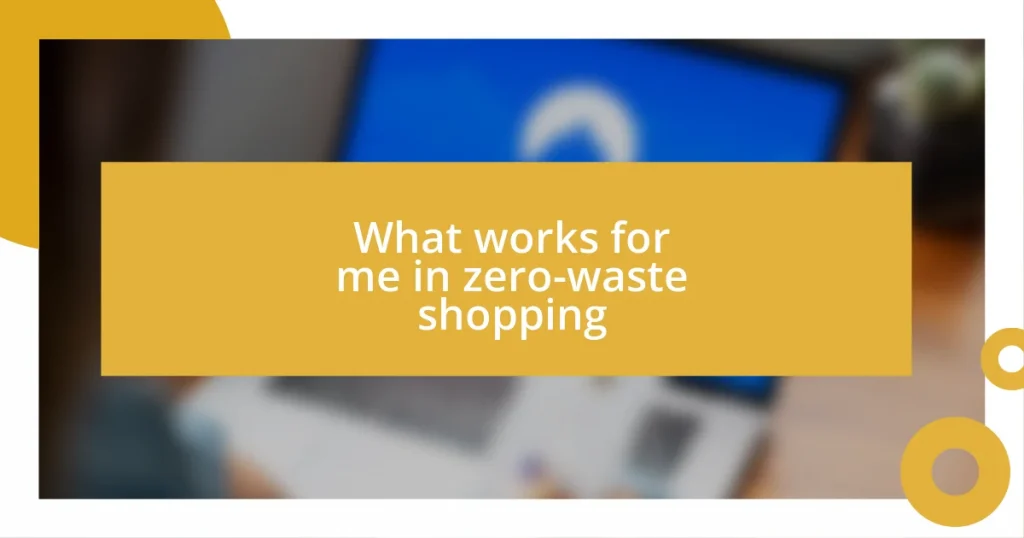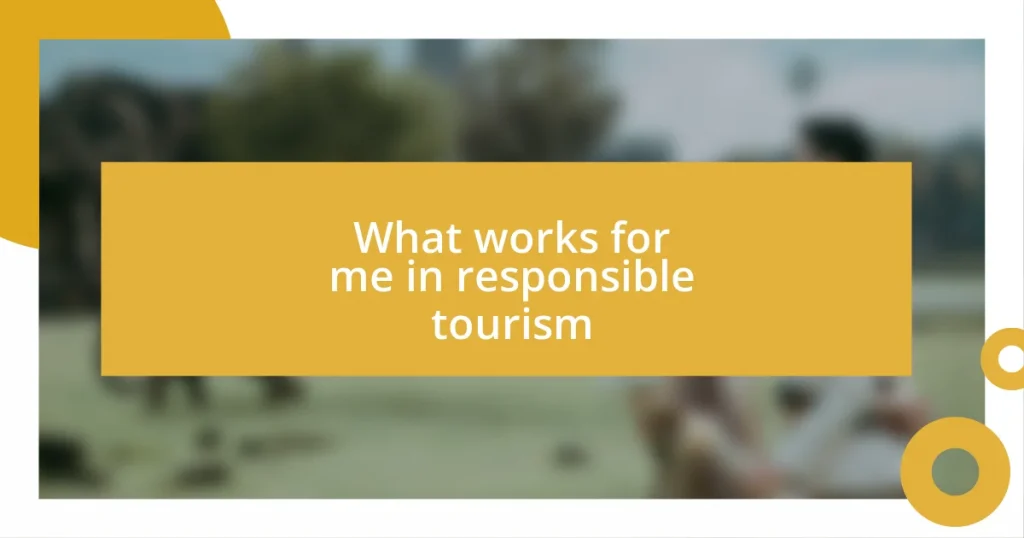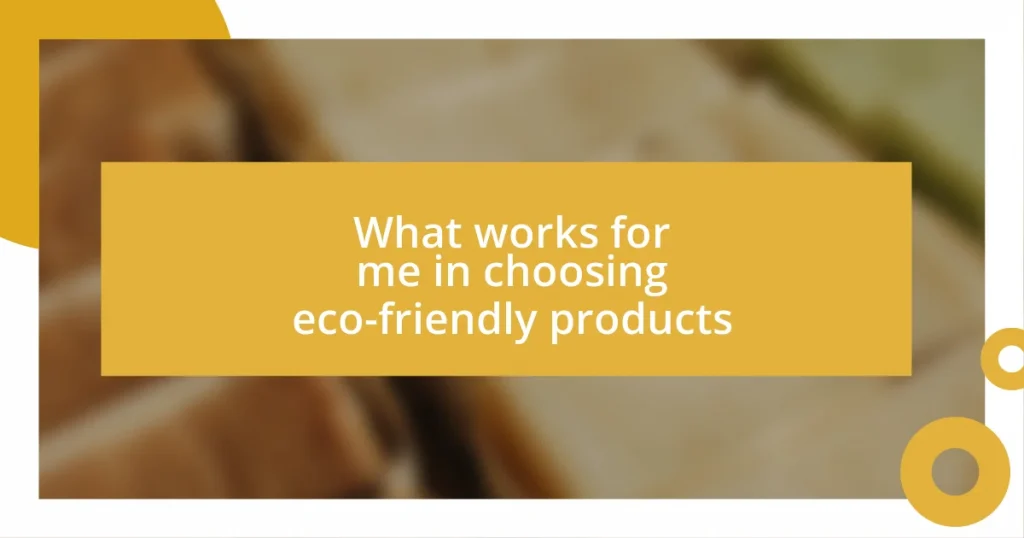Key takeaways:
- Personal empowerment involves recognizing one’s unique value and taking ownership of choices, leading to self-acceptance and growth.
- Building strong relationships through vulnerability, trust, and consistent communication fosters a supportive environment where individuals feel empowered.
- Creating opportunities for others and measuring the impact of empowerment initiatives are crucial for personal and community growth, highlighting the importance of mentorship and recognizing hidden potential.

Understanding Personal Empowerment
Personal empowerment is like uncovering a hidden treasure within ourselves. I vividly remember a moment when I stood before a group, feeling utterly out of my depth. But as I spoke, I discovered that sharing my story not only galvanized me but also inspired others. How often do we underestimate our own narratives and the power they hold?
When I reflect on my journey, I realize that personal empowerment isn’t solely about confidence; it’s about recognizing our inherent value. There was a time when I hesitated to voice my opinions, fearing they weren’t worth sharing. Yet, that epiphany—realizing that every perspective is unique and valid—propelled me into a realm of self-acceptance that profoundly changed my interactions with others. Have you ever felt that powerful shift when you finally embrace your voice?
Empowerment also means taking ownership of our choices. I recall a period in my life where I felt stuck, caught in a cycle of indecision. It was only when I decided to actively make different choices—whether big or small—that I began to reclaim my agency. Isn’t it fascinating how a single decision can set the course for our growth? Each step, no matter how small, brings us closer to realizing our potential and helping others find theirs as well.

Identifying My Purpose and Values
Identifying my purpose and values has been a transformative journey, one that often felt like piecing together a puzzle. I remember a particularly poignant moment on a quiet afternoon when I reflected on what truly mattered to me. It struck me that my deepest values—compassion, authenticity, and growth—were guiding me in my desire to empower others. Acknowledging this personal truth shifted my perspective and anchored my mission in a way I hadn’t anticipated.
Some key elements that shaped my understanding of my purpose and values are:
– Self-Reflection: Taking time to pause and assess my experiences and emotions allowed me to clarify what I stand for.
– Feedback from Others: Listening to friends and mentors helped me see the impact I can have, fueling my passion to empower others.
– Life Experiences: Navigating challenges, such as overcoming personal setbacks, taught me resilience and the importance of uplifting those around me.
– Passions and Interests: Engaging with activities that ignite my enthusiasm helped me identify what I genuinely care about.
– Active Exploration: Seeking out new experiences has continuously honed my sense of purpose and reinforced my values.
These elements came together to create a vision that not only energizes me but also serves as a beacon for those I aim to empower.

Building Strong Relationships
Building strong relationships is fundamental to empowering others, and I’ve learned that vulnerability plays a key role in this process. I recall a particularly eye-opening experience at a community workshop. When I shared my challenges and listened to others share theirs, a sense of camaraderie emerged. Suddenly, we were no longer strangers; we were a circle of support, each person validating the other’s struggles and triumphs. Isn’t it incredible how vulnerability can break down barriers and foster trust?
Trust, in my experience, is the bedrock of any meaningful relationship. I remember working with a group of young adults, encouraging them to express their dreams and aspirations. By cultivating a safe space, where judgment was replaced with understanding, I witnessed participants open up in ways I never expected. They began to support each other, recognizing the power of shared experiences. Have you felt that warm sense of community when trust is established? It’s truly transformative.
Moreover, consistent communication is essential for nurturing strong relationships. Taking the time to check in with those I empower has always paid off. A quick text or a casual coffee chat can create lasting connections. I often ask how they’re doing or what challenges they’re facing, and this simple act can invite an open dialogue. It’s fascinating how those little moments of engagement can deepen relationships and encourage growth in others.
| Key Elements | Examples |
|---|---|
| Vulnerability | Sharing personal challenges to build trust |
| Trust | Creating a safe space for open expression |
| Consistent Communication | Regular check-ins to strengthen connections |

Developing Effective Communication Skills
Effective communication skills are vital in empowering others, and my journey in this area has been quite enlightening. I once attended a workshop on active listening, and it changed my perspective completely. I learned that listening isn’t just about hearing words; it’s about understanding emotions and intentions behind those words. When I started practicing this in my daily interactions, I noticed how people felt more valued and understood.
I recall a moment during a coaching session with a participant who struggled to articulate her thoughts. Instead of jumping in with suggestions, I focused on mirroring her feelings and asking open-ended questions. “What does success look like for you?” I asked. Watching her face light up as she spoke her truth was magical. It reminded me how powerful it is to create an environment where others feel safe to express themselves. Have you ever noticed how a simple question, asked genuinely, can unlock deeper conversations?
Moreover, non-verbal communication has also played a significant role in my journey. I remember challenging myself to be more aware of my body language and tone. One particular experience stands out: while facilitating a discussion, I realized my eagerness to contribute was reflected in my posture. I consciously relaxed my shoulders and leaned in slightly, signaling that I was truly present. This small adjustment prompted others to engage more openly, sparking a richer dialogue. I often wonder, how often do we overlook these subtle cues that can either foster connection or create distance?

Creating Opportunities for Others
Creating opportunities for others is truly at the heart of empowerment. I’ll never forget a time when I hosted a small networking event for individuals in my community. The excitement in the room was palpable; people were exchanging ideas, sharing their resources, and, most importantly, forming connections that could lead to collaboration. Isn’t it remarkable how one gathering can ignite so many possibilities?
I often think about the significance of mentorship in this process. I once had the privilege of mentoring a young woman who was unsure of her career path. We spent time exploring her interests and skills, and I pointed her towards various workshops and events. Watching her grow in confidence as she seized these opportunities and eventually landed her dream job was an absolute joy. It leaves me wondering: how many lives can change if we intentionally create pathways for others?
Moreover, I’ve found that empowering others often comes down to recognizing potential in places others overlook. One day, I noticed a teammate’s unique talent for design during a project meeting. I encouraged her to lead our next campaign. Seeing her flourish in that role—and the pride on her face—reminded me that sometimes, all people need is a little nudge in the right direction. Have you ever considered what hidden talents are waiting to be uncovered in your circle?

Measuring Impact and Success
Measuring impact and success in empowering others requires a blend of qualitative and quantitative approaches. I recall setting specific, measurable goals when I started a community outreach program. Looking back, I was so nervous about how we would evaluate our progress. However, tracking metrics, such as the number of participants who reported improvements in their skills, truly illuminated the program’s effectiveness and its reach.
It’s also essential to collect personal stories and testimonials to capture the deeper emotional impact of our initiatives. One participant shared how our program helped her gain the confidence to pursue public speaking. That moment struck a chord with me—who knew that a single workshop could lead to such transformation? Engagement isn’t just a number; it’s about the lives we touch. How do you discern the difference between success measured in numbers and success measured in human experiences?
Finally, regular reflection on these outcomes allows for continuous improvement. After each initiative, I gather my team to discuss what worked and what didn’t. This honest dialogue fosters a culture of growth and makes us more attuned to the needs of those we aim to empower. Have you ever considered how reflecting on our successes and failures can help refine our approach and deepen our impact? It’s all part of the journey of growing together.

Sharing My Empowerment Journey
Sharing my empowerment journey has been a tapestry woven with rich experiences and heartwarming connections. One powerful memory stands out: during a local workshop I facilitated, I witnessed participants’ faces light up as they discovered their strengths. That moment reminded me of the importance of creating safe spaces where people can explore their potential. Have you ever felt that spark when someone realizes they can achieve more than they thought possible?
As I reflect on this journey, I’m deeply moved by the stories of transformation that emerged from my initiatives. I remember an individual who, after joining my coaching sessions, conquered her fear of public speaking. The first time she addressed a small audience, the pride in her eyes was palpable. It’s in these moments that I realize empowerment is not just about skills; it’s about building confidence and belief. How often do we see the quiet strength within others that they themselves don’t recognize?
Ultimately, sharing my journey is about learning as I go along. Every experience, whether filled with success or challenge, has taught me the value of patience and resilience. I often ask myself, what lessons can I glean from each interaction? The richness of this journey lies not only in the milestones but also in the relationships formed and the stories shared along the way. Isn’t it fascinating how every encounter adds a layer of depth to our understanding of empowerment?















